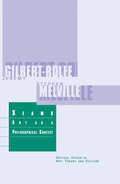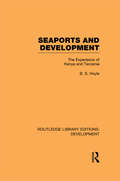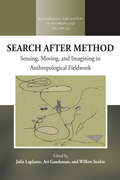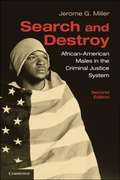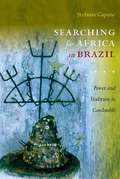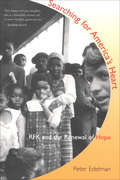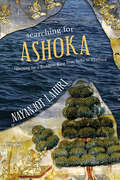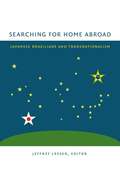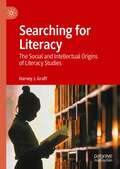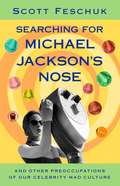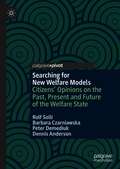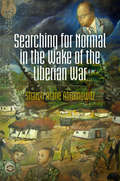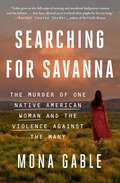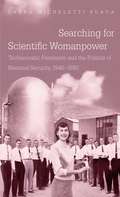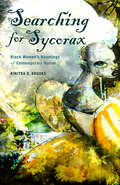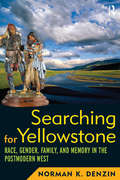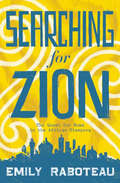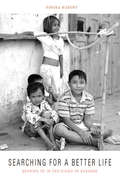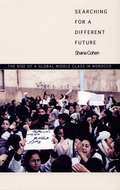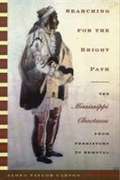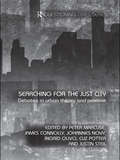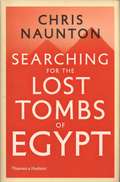- Table View
- List View
Seams: Art as a Philosophical Context (Critical Voices in Art, Theory and Culture #Vol. 2)
by Stephen Melville Jeremy Gilbert-RolfeFirst published in 1997. Routledge is an imprint of Taylor & Francis, an informa company.
Seaports and Development: The Experience of Kenya and Tanzania (Routledge Library Editions: Development #69)
by B. S. HoyleThis book, originally published in 1983, demonstrates the importance of seaports in the growth of less-developed countries. The author focuses on the character of port activity within the context of transport systems and regional economic planning. General principles of port development are illustrated by detailed reference to one Third World port group, that of the Indian Ocean coasts of Kenya and Tanzania. The objective is not merely to illustrate the character of one specific group of ports, but to demonstrate methods of analysis and to underline the crucial role of ports in the development process.
Search After Method: Sensing, Moving, and Imagining in Anthropological Fieldwork (Methodology & History in Anthropology #40)
by Julie Laplante, Ari Gandsman Willow ScobieReigniting a tradition of learning by experience, Search After Method is a plea for more lively forms of anthropology. The multiple voices resonating in the collection come from anthropologists in all walks of academia as well as outside of it. The chapters relate the contributor’s first experiences of working in the field and use their experiences to link their work to the discipline of Anthropology, along with other broader fieldwork questions. This book thus provides a powerful introduction to lived experiences of contemporary fieldwork.
Search and Destroy: African-American Males in the Criminal Justice System
by Jerome G. MillerThis tightly argued and methodologically sound volume addresses widespread social assumptions associating crime and African-American men. An exploration into the criminal justice system in America today and its impact on young African-American males, this book challenges the linking of crime and race and the conservative anti-welfare, hard-on-crime agenda. Jerry Miller has spent a lifetime studying and challenging our criminal justice system. He has worked to make it more progressive and more just. He has watched as it turned into a system of segregation and control for many Americans of color. That is the story told here in devastating detail.
Searching for Africa in Brazil: Power and Tradition in Candomblé
by Stefania CaponeSearching for Africa in Brazil is a learned exploration of tradition and change in Afro-Brazilian religions. Focusing on the convergence of anthropologists' and religious leaders' exegeses, Stefania Capone argues that twentieth-century anthropological research contributed to the construction of an ideal Afro-Brazilian religious orthodoxy identified with the Nag (Yoruba) cult in the northeastern state of Bahia. In contrast to other researchers, Capone foregrounds the agency of Candombl leaders. She demonstrates that they successfully imposed their vision of Candombl on anthropologists, reshaping in their own interest narratives of Afro-Brazilian religious practice. The anthropological narratives were then taken as official accounts of religious orthodoxy by many practitioners of Afro-Brazilian religions in Brazil. Capone draws on ten years of ethnographic fieldwork in Salvador de Bahia and Rio de Janeiro as she demonstrates that there is no pure or orthodox Afro-Brazilian religion. Challenging the usual interpretations of Afro-Brazilian religions as fixed entities, completely independent of one another, Capone reveals these practices as parts of a unique religious continuum. She does so through an analysis of ritual variations as well as discursive practices. To illuminate the continuum of Afro-Brazilian religious practice and the tensions between exegetic discourses and ritual practices, Capone focuses on the figure of Exu, the sacred African trickster who allows communication between gods and men. Following Exu and his avatars, she discloses the centrality of notions of prestige and power--mystical and religious--in Afro-Brazilian religions. To explain how religious identity is constantly negotiated among social actors, Capone emphasizes the agency of practitioners and their political agendas in the "return to roots," or re-Africanization, movement, an attempt to recover the original purity of a mythical and legitimizing Africa.
Searching for America's Heart: RFK and the Renewal of Hope
by Peter EdelmanFrom an author who resigned from the Clinton administration: “Part memoir and part manifesto . . . a beautifully written call to renew the fight against poverty.”?Jonathan Kozol, New York Times bestselling author of Savage InequalitiesPeter Edelman has worked as an aide to Robert F. Kennedy, a lawyer, a children’s advocate, and a policymaker. He has devoted his life to the cause of justice and to ending inequality. But in 1996, while serving in the Clinton administration as an expert on welfare policy and children, he found himself in an untenable position. The president signed a new welfare bill that ended a sixty-year federal commitment to poor children, and as justification invoked the words of RFK. For Edelman, Clinton’s twisting of Kennedy’s vision was deeply cynical, so in a rare gesture that sparked front-page headlines, he resigned. The nation, he believed, had been harmed.In this book, he shows that in an age of unprecedented prosperity, Americans have in many respects forsaken their fellow citizens, leaving behind a devastatingly large number of poor and near-poor, many of them children. Edelman shines a bright light on these forgotten Americans. Based in part on a firsthand look at community efforts across the country, he also proposes a bold and practical program for addressing the difficult issues of entrenched poverty, focusing on novel ways of braiding together national and local civic activism, reinvigorating our commitment to children, and building hope in our most shattered communities—creating a vision true to the legacy of Robert F. Kennedy.“Moving and insightful.” —Atlanta Journal-Constitution“I have read a lot of books on inequality, but none offers a more thoughtful vision of poverty and welfare in America . . . compelling.”?William Julius Wilson, author of When Work Disappears
Searching for Ashoka: Questing for a Buddhist King from India to Thailand
by Nayanjot LahiriReveals how the persona of India's most famous emperor was constantly reinvented in ancient times to suit a variety of social visions, political agendas, and moral purposes.Blending travelogue, history, and archaeology, Searching for Ashoka unravels the various avatars of India's most famous emperor, revealing how he came to be remembered-and forgotten-in distinctive ways at particular points in time and in specific locations. Through personal journeys that take her across India and to various sites and cities in Sri Lanka, Myanmar, and Thailand, archaeologist Nayanjot Lahiri explores how Ashoka's visibility from antiquity to the modern era has been accompanied by a reinvention of his persona. Although the historical Ashoka spoke expansively of his ideas of governance and a new kind of morality, his afterlife is a jumble of stories and representations within various Buddhist imaginings. By remembering Ashoka selectively, Lahiri argues, ancient kings and chroniclers created an artifice, constantly appropriating and then remolding history to suit their own social visions, political agendas, and moral purposes.
Searching for Home Abroad: Japanese Brazilians and Transnationalism
by Jeffrey LesserDuring the first half of the twentieth century, Japanese immigrants entered Brazil by the tens of thousands. In more recent decades that flow has been reversed: more than 200,000 Japanese-Brazilians and their families have relocated to Japan. Examining these significant but rarely studied transnational movements and the experiences of Japanese-Brazilians, the essays in Searching for Home Abroad rethink complex issues of ethnicity and national identity. The contributors--who represent a number of nationalities and disciplines themselves--analyze how the original Japanese immigrants, their descendants in Brazil, and the Japanese-Brazilians in Japan sought to fit into the culture of each country while confronting both prejudice and discrimination. The concepts of home and diaspora are engaged and debated throughout the volume. Drawing on numerous sources--oral histories, interviews, private papers, films, myths, and music--the contributors highlight the role ethnic minorities have played in constructing Brazilian and Japanese national identities. The essayists consider the economic and emotional motivations for migration as well as a range of fascinating cultural outgrowths such as Japanese secret societies in Brazil. They explore intriguing paradoxes, including the feeling among many Japanese-Brazilians who have migrated to Japan that they are more "Brazilian" there than they were in Brazil. Searching for Home Abroad will be of great interest to scholars of immigration and ethnicity in the Americas and Asia. Contributors. Shuhei Hosokawa, Angelo Ishi, Jeffrey Lesser, Daniel T. Linger, Koichi Mori, Joshua Hotaka Roth, Takeyuki (Gaku) Tsuda, Keiko Yamanaka, Karen Tei Yamashita
Searching for Juliet: The Lives and Deaths of Shakespeare's First Tragic Heroine
by Sophie Duncan'A thirteen-year-old girl is at a party. A boy, slightly older, sees her. Juliet. This book is about that girl.'A cultural, historical and literary exploration of the birth, death and legacy of the ultimate romantic heroine - Shakespeare's Juliet Capulet.Juliet Capulet is the heartbeat of the world's most famous love story. She is an enduring romantic icon. And she is a captivating, brilliant, passionate teenage girl who is read and interpreted afresh by each new generation.Searching for Juliet takes us from the Renaissance origin stories behind William Shakespeare's child bride to the boy actor who inspired her creation onstage. From enslaved people in the Caribbean to Italian fascists in Verona, and real-life lovers in Afghanistan. From the Victorian stage to 1960s cinema, Baz Luhrmann and beyond.Sophie Duncan draws on rich cultural and historical sources and new research to explore the legacy and reach of Romeo and Juliet far beyond the literary sphere. With warmth, wit and insight, she shows us why Juliet is for now, for ever, for everyone.(P)2023 Hodder & Stoughton Limited
Searching for Juliet: The Lives and Deaths of Shakespeare's First Tragic Heroine
by Sophie Duncan'Witty and scholarly'JONATHAN BATE, SUNDAY TELEGRAPH'Thrilling'GUARDIAN'Illuminating . . . as vital and provocative as the character herself'LITERARY REVIEW'Buoyant'TIMES LITERARY SUPPLEMENT'An astonishing tour-de-force'MARION TURNER, author of The Wife of Bath: A BiographyWho is Juliet Capulet?Daughter of VeronaLovestruck TeenagerRomantic IconTragic HeroineRebelSearching for Juliet takes us from the Renaissance origin stories behind Shakespeare's child bride to enslaved people in the Caribbean, Italian fascists in Verona, and real-life lovers in Afghanistan. From the Victorian stage to 1960s cinema, Baz Luhrmann, and beyond. Drawing on rich cultural and historical sources and new research, Sophie Duncan shows us why Juliet is for now, for ever, for everyone.
Searching for Literacy: The Social and Intellectual Origins of Literacy Studies
by Harvey J. GraffThis book provides a critical account of the development of questions, approaches, methods, and understandings of literacy within and across disciplines and interdisciplines. It provides a critique of literacy studies, including the New Literacy Studies. This book completes a series that the author began in the 1970s. It criticizes and revises the New Literacy Studies and how we think about literacy generally. It is a revisionist study which argues that literacy and literacy studies are historical developments and must be understood in those terms to comprehend their profound impact on our traditions of thinking about and understanding literacy, and how we study it. Graff argues that literacy studies in its academic, institutional, and policy forums, but also in popular parlance, has lost its critical foundations, and this hinders efforts to promote literacy. He examines literacy over time and across linguistics; anthropology; psychology; reading and writing across modes of communication and comprehension; “new” literacies across digital, visual, performance, numerical, and scientific domains; and history. He underscores the value of new directions of negotiation and translation. This book will interest scholars and students in the many fields that constitute literacy studies across the humanities, social sciences, education, and beyond.
Searching for Michael Jackson's Nose: And Other Preoccupations of Our Celebrity-Mad Culture
by Scott FeschukIn his first book, National Post columnist Scott Feschuk offers a hilarious, satirical take on trends in television and our peculiar obsession with the famous, the infamous, and the nature of Tom Cruise’s sexuality. Searching for Michael Jackson’s Nose romps through the birth and the future of reality television, takes readers to the all-star parties thrown each summer by the major American television networks, and makes the case that what the world needs now is more – yes, more! – showbiz award shows. It pokes fun at Hollywood’s rich and renowned, and also at Steve Guttenberg. It both applauds and skewers our intensifying fascination with the profoundly inconsequential: tribal councils, celebrity interviews, the crude romantic exploits of bachelors and bogus millionaires. And it takes us on a tour through the prevailing popular culture of the twenty-first century, with stops at the Starship Enterprise, Britney Spears, Sesame Street, the Oscars, Pamela Anderson, a naked Billy Baldwin, and the everchanging facial topography of the King of Pop.
Searching for New Welfare Models: Citizens' Opinions on the Past, Present and Future of the Welfare State
by Dennis Anderson Barbara Czarniawska Rolf Solli Peter DemediukThis book explores the ways in which different generations think about how the welfare state is organised at present, and how it will be organised in future. Using the results of a study from Canada, Australia and Sweden, the book’s findings complement more traditional studies of the welfare sector, capturing the anxieties of citizens about the present and future of their countries’ welfare models, and presenting their thoughts on how the system can be re-organised in future. Positioning their three-country study within the history of the welfare state around the world, the authors seek to re-assess the role of the welfare state in governments around the world. Their findings will be of interest to those studying welfare policy as well as innovations such as basic income, e-health and policy responses to automisation.
Searching for Normal in the Wake of the Liberian War (Pennsylvania Studies in Human Rights)
by Sharon Alane AbramowitzAt the end of Liberia's thirteen-year civil war, the devastated population struggled to rebuild their country and come to terms with their experiences of violence. During the first decade of postwar reconstruction, hundreds of humanitarian organizations created programs that were intended to heal trauma, prevent gendered violence, rehabilitate former soldiers, and provide psychosocial care to the transitioning populace. But the implementation of these programs was not always suited to the specific mental health needs of the population or easily reconciled with the broader aims of reconstruction and humanitarian peacekeeping, and psychiatric treatment was sometimes ignored or unevenly integrated into postconflict humanitarian health care delivery.Searching for Normal in the Wake of the Liberian War explores the human experience of the massive apparatus of trauma-healing and psychosocial interventions during the first five years of postwar reconstruction. Sharon Alane Abramowitz draws on extensive fieldwork among the government officials, humanitarian leaders, and an often-overlooked population of Liberian NGO employees to examine the structure and impact of the mental health care interventions, in particular the ways they were promised to work with peacekeeping and reconstruction, and how the reach and effectiveness of these promises can be measured. From this courageous ethnography emerges a geography of trauma and the ways it shapes the lives of those who give and receive care in postwar Liberia.
Searching for Savanna: The Murder of One Native American Woman and the Violence Against the Many
by Mona GableA gripping and illuminating investigation into the disappearance of Savanna LaFontaine-Greywind when she was eight months pregnant, highlighting the shocking epidemic of violence against Native American women in America and the societal ramifications of government inaction.In the summer of 2017, twenty-two-year-old Savanna LaFontaine-Greywind vanished. A week after she disappeared, police arrested the white couple who lived upstairs from Savanna and emerged from their apartment carrying an infant girl. The baby was Savanna&’s, but Savanna&’s body would not be found for days. The horrifying crime sent shock waves far beyond Fargo, North Dakota, where it occurred, and helped expose the sexual and physical violence Native American women and girls have endured since the country&’s colonization. With pathos and compassion, Searching for Savanna confronts this history of dehumanization toward Indigenous women and the government&’s complicity in the crisis. Featuring in-depth interviews, personal accounts, and trial analysis, Searching for Savanna investigates these injustices and the decades-long struggle by Native American advocates for meaningful change.
Searching for Scientific Womanpower
by Laura Micheletti PuacaThis compelling history of what Laura Micheletti Puaca terms "technocratic feminism" traces contemporary feminist interest in science to the World War II and early Cold War years. During a period when anxiety about America's supply of scientific personnel ran high and when open support for women's rights generated suspicion, feminist reformers routinely invoked national security rhetoric and scientific "manpower" concerns in their efforts to advance women's education and employment. Despite the limitations of this strategy, it laid the groundwork for later feminist reforms in both science and society. The past and present manifestations of technocratic feminism also offer new evidence of what has become increasingly recognized as a "long women's movement."Drawing on an impressive array of archival collections and primary sources, Puaca brings to light the untold story of an important but largely overlooked strand of feminist activism. This book reveals much about the history of American feminism, the politics of national security, and the complicated relationship between the two.
Searching for Sycorax: Black Women's Hauntings of Contemporary Horror
by Kinitra D. BrooksSearching for Sycorax highlights the unique position of Black women in horror as both characters and creators. Kinitra D. Brooks creates a racially gendered critical analysis of African diasporic women, challenging the horror genre’s historic themes and interrogating forms of literature that have often been ignored by Black feminist theory. Brooks examines the works of women across the African diaspora, from Haiti, Trinidad, and Jamaica, to England and the United States, looking at new and canonized horror texts by Nalo Hopkinson, NK Jemisin, Gloria Naylor, and Chesya Burke. These Black women fiction writers take advantage of horror’s ability to highlight U.S. white dominant cultural anxieties by using Africana folklore to revise horror’s semiotics within their own imaginary. Ultimately, Brooks compares the legacy of Shakespeare’s Sycorax (of The Tempest) to Black women writers themselves, who, deprived of mainstream access to self-articulation, nevertheless influence the trajectory of horror criticism by forcing the genre to de-centralize whiteness and maleness.
Searching for Whitopia: An Improbable Journey to the Heart of White America
by Rich BenjaminAs America becomes more and more racially diverse, Rich Benjamin noticed a phenomenon: Some communities were actually getting less multicultural. So he got out a map, found the whitest towns in the USA--and moved in.A journalist-adventurer, Benjamin packed his bags and embarked on a 26,909-mile journey throughout the heart of white America, to some of the fastest-growing and whitest locales in our nation. Benjamin calls these enclaves "Whitopias." In this groundbreaking book, he shares what he learned as a black man in Whitopia. Benjamin's journey to unlock the mysteries of Whitopia took him from a three-day white separatist retreat with links to Aryan Nations in North Idaho to exurban mega-churches down South, and many points in between. A compelling raconteur, bon vivant, and scholar, Benjamin reveals what Whitopias are like and explores the urgent social and political implications of this startling phenomenon. Benjamin's groundbreaking study is one of few to have illuminated in advance the social and political forces propelling the rise of Donald Trump. After all, Trump carried 94 percent of America's Whitopian counties. And he won a median 67 percent of the vote in Whitopia compared to 46 percent of the vote nationwide.Leaving behind speculation or sensationalism, Benjamin explores the future of whiteness and race in an increasingly multicultural nation.
Searching for Yellowstone: Race, Gender, Family and Memory in the Postmodern West
by Norman K DenzinYellowstone. Sacagawea. Lewis & Clark. Transcontinental railroad. Indians as college mascots. All are iconic figures, symbols of the West in the Anglo-American imagination. Well-known cultural critic Norman Denzin interrogates each of these icons for their cultural meaning in this finely woven work. Part autoethnography, part historical narrative, part art criticism, part cultural theory, Denzin creates a postmodern bricolage of images, staged dramas, quotations, reminiscences and stories that strike to the essence of the American dream and the shattered dreams of the peoples it subjugated.
Searching for Zion: The Quest for Home in the African Diaspora
by Emily RaboteauFrom Jerusalem to Ghana to Katrina-ravaged New Orleans, a woman reclaims her history in a &“beautifully written and thought-provoking&” memoir (Dave Eggers, author of A Hologram for the King and Zeitoun). A biracial woman from a country still divided along racial lines, Emily Raboteau never felt at home in America. As the daughter of an African American religious historian, she understood the Promised Land as the spiritual realm black people yearned for. But while visiting Israel, the Jewish Zion, she was surprised to discover black Jews. More surprising was the story of how they got there. Inspired by their exodus, her question for them is the same one she keeps asking herself: have you found the home you&’re looking for? In this American Book Award–winning inquiry into contemporary and historical ethnic displacement, Raboteau embarked on a ten-year journey around the globe and back in time to explore the complex and contradictory perspectives of black Zionists. She talked to Rastafarians and African Hebrew Israelites, Evangelicals and Ethiopian Jews—all in search of territory that is hard to define and harder to inhabit. Uniting memoir with cultural investigation, Raboteau overturns our ideas of place, patriotism, dispossession, citizenship, and country in &“an exceptionally beautiful . . . book about a search for the kind of home for which there is no straight route, the kind of home in which the journey itself is as revelatory as the destination&” (Edwidge Danticat, author of The Farming of Bones).
Searching for a Better Life: Growing Up in the Slums of Bangkok
by Sorcha MahonyLife in Bangkok for young people is marked by profound, interlocking changes and transitions. This book offers an ethnographic account of growing up in the city’s slums, struggling to get by in a rapidly developing and globalizing economy and trying to fulfil one’s dreams. At the same time, it reflects on the issue of agency, exploring its negative potential when exercised by young people living under severe structural constraint. It offers an antidote to neoliberal ideas around personal responsibility, and the assumed potential for individuals to break through structures of constraint in any sustained way.
Searching for a Different Future: The Rise of a Global Middle Class In Morocco
by Shana CohenBy examining how neoliberal economic reform policies have affected educated young adults in contemporary Morocco, Searching for a Different Future posits a new socioeconomic formation: the global middle class. During Morocco's postcolonial period, from the 1950s through the 1970s, development policy and nationalist ideology supported the formation of a middle class based on the pursuit of education, employment, and material security. Neoliberal reforms adopted by Morocco since the early 1980s have significantly eroded the capacity of the state to nurture the middle class, and unemployment and temporary employment among educated adults has grown. There is no longer an obvious correlation between the best interests of the state and those of the middle-class worker. As Shana Cohen demonstrates, educated young adults in Morocco do not look toward the state for economic security and fulfillment but toward the diffuse, amorphous global market. Cohen delves into the rupture that has occurred between the middle class, the individual, and the nation in Morocco and elsewhere around the world. Combining institutional economic analysis with cultural theory and ethnographic observation including interviews with seventy young adults in Casablanca and Rabat, she reveals how young, urban, educated Moroccans conceive of their material, social, and political conditions. She finds that, for the most part, they perceive improvement in their economic and social welfare apart from the types of civic participation commonly connected with nationalism and national identity. In answering classic sociological questions about how the evolution of capitalism influences identity, Cohen sheds new light on the measurable social and economic consequences of globalization and on its less tangible effects on individuals' perception of their place in society and prospects in life.
Searching for the Bright Path: The Mississippi Choctaws from Prehistory to Removal
by James Taylor CarsonBlending an engaging narrative style with broader theoretical considerations, James Taylor Carson offers the most complete history to date of the Mississippi Choctaws. Tracing the Choctaws from their origins in the Mississippian cultures of late prehistory to the early nineteenth century, Carson shows how the Choctaws struggled to adapt to life in a New World altered radically by contact while retaining their sense of identity and place. Despite changes in subsistence practices and material culture, the Choctaws made every effort to retain certain core cultural beliefs and sensibilities, a strategy they conceived of as following “the straight bright path.” This work also makes a significant theoretical contribution to ethnohistory as Carson confronts common problems in the historical analysis of Native peoples.
Searching for the Just City: Debates in Urban Theory and Practice (Questioning Cities)
by Peter Marcuse Johannes Novy James Connolly Ingrid Olivo Cuz Potter Justin SteilCities are many things. Among their least appealing aspects, cities are frequently characterized by concentrations of insecurity and exploitation. Cities have also long represented promises of opportunity and liberation. Public decision-making in contemporary cities is full of conflict, and principles of justice are rarely the explicit basis for the resolution of disputes. If today’s cities are full of injustices and unrealized promises, how would a Just City function? Is a Just City merely a utopia, or does it have practical relevance? This book engages with the growing debate around these questions. The notion of the Just City emerges from philosophical discussions about what justice is combined with the intellectual history of utopias and ideal cities. The contributors to this volume, including Susan Fainstein, David Harvey and Margit Mayer articulate a conception of the Just City and then examine it from differing angles, ranging from Marxist thought to communicative theory. The arguments both develop the concept of a Just City and question it, as well as suggesting alternatives for future expansion. Explorations of the concept in practice include case studies primarily from U.S. cities, but also from Europe, the Middle East and Latin America. The authors find that a forthright call for justice in all aspects of city life, putting the question of what a Just City should be on the agenda of urban reform, can be a practical approach to solving questions of urban policy. This synthesis is provocative in a globalised world and the contributing authors bridge the gap between theoretical conceptualizations of urban justice and the reality of planning and building cities. The notion of the Just City is an empowering framework for contemporary urban actors to improve the quality of urban life and Searching for the Just City is a seminal read for practitioners, professionals, students, researchers and anyone interested in what urban futures should aim to achieve.
Searching for the Lost Tombs of Egypt
by Chris NauntonArcheologist Chris Naunton examines the famous pharaohs, their achievements, the bling they might have been buried with, the circumstances in which they were buried, and why those circumstances may have prevented archeologists from finding these tombs.
